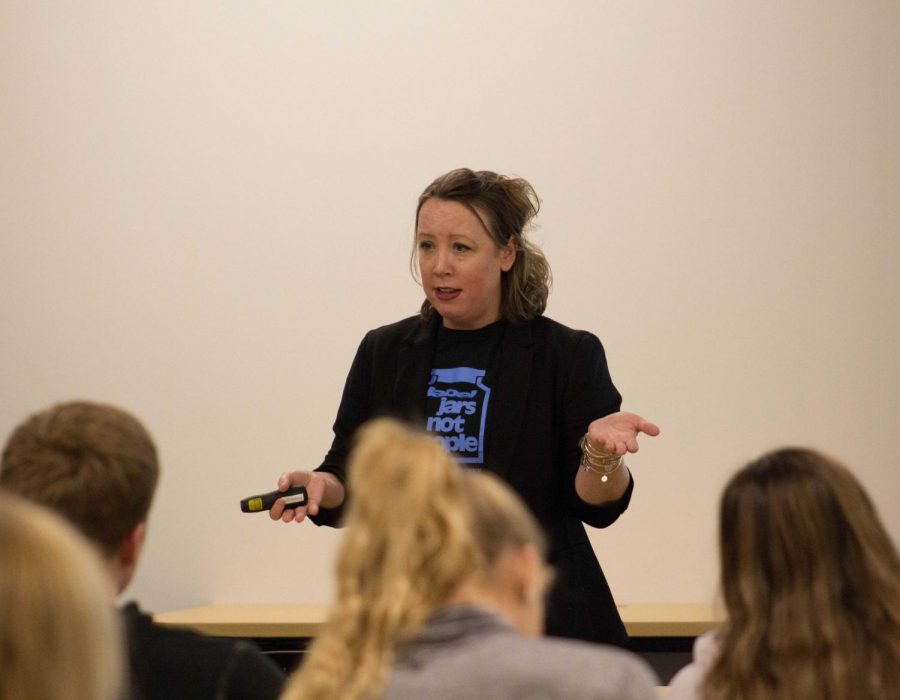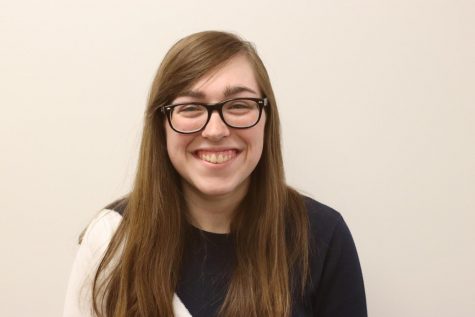Disabilities discuss by campus community
UNI hosted “The Relevance of Disability Studies in Education: A Framework for Change,” on Monday, Feb. 19 at 7 p.m.
Feb 22, 2018
On Monday, Feb. 19 at 7 p.m., UNI hosted “The Relevance of Disability Studies in Education: A Framework for Change” in the Scholar Space in Rod Library. The event aimed to show how disabilities are handled in the school system and how to improve current methods.
There were about 45 people in attendance to listen to three individuals on a panel discuss diversity on campus, specifically involving disability. Students, staff, faculty and the community were welcome to attend the event.
The first speaker was Amy Peterson, an associate professor of special education. She is involved in one of the minor programs on campus that helps to prepare educators on how to properly accommodate disabled students.
Peterson began the discussion by analyzing how the UNI campus, as a community, can change in order to be more inclusive.
“We, as a UNI community, very much value and care about diversity,” Peterson said. “This book group that I was a part of was very conscientious; they were very open and willing to share, but, interestingly, very few of us had had real meaningful experiences with people different than ourselves. We also knew very little about the history of diverse groups, and we had very few opportunities to really explore the social, cultural, political and historical contexts in which diversity issues are grounded.”
Danielle Cowley, an assistant professor of special education, is involved in a minor program on campus that focuses on helping UNI students understand the intersection between gender and disability.
Cowley presented artwork to the attendees by artist Reva Lehrer, who is disabled herself.
Cowley then raised a rhetorical question to the audience, asking: “What is disability studies?”
“We start off talking about what is disability studies by defining what it is not,” Cowley said. “So, disability studies is not special education. Disability studies is not vocational rehabilitation counseling. It’s not the study of disability from a traditional kind of lens. It’s the study of disability from a very different perspective.”
The final speaker, David Hernandez-Saca, is an assistant professor of special education, whose main focus is special education law, assistive technology and advocacy for pre-service teachers. He also teaches a class on transition to help disabled individuals feel more comfortable in new environments.
Hernandez-Saca explored intersectionality and how everyone has different facets of who they are. He explained how these facets structure who everyone is and how it helps them to experience things.
“There are definitely places of power and privilege so we can’t conflate intersectionality as being about multiple identities, per se,” Hernandez-Saca said. “It’s really about the ways of particular sights of oppression or privilege.”
The colloquium ended with each speaker talking about ways in which UNI as a campus can accommodate disabled people and make them feel more comfortable in their environment.
Abby Hudson, a sophomore nursing major, went to the discussion to learn more about disabled individuals in relationship to her major.
“It was really interesting just to hear their viewpoints and how we can be an [ally] and what we can learn because we have always learned things, like [how] the r-word is really bad,” Hudson said. “But, there are more complex issues that need to be brought up, like not having ramp access in buildings for disabled people.”
Another attendee, Brooke Jacobsen, a senior psychology and criminology double major, attended the colloquium to learn more about how UNI can help disabled individuals.
“I didn’t even know there was a disability movement or anything like that,” Jacobsen said. “Diversity is becoming more of a topic, and we are still excluding people from that. I think that disabled people are probably the most victimized in that sense.”









